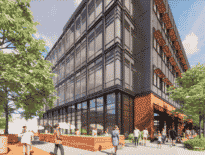Massachusetts will need to adapt its workforce training, public transit and child care systems to better support workers in a post–COVID-19 economy, a special legislative commission recommended Tuesday in a new report developed over the past year looking at ways the pandemic has changed the economy.
The 53-page report concludes that hybrid and remote work models are “here to stay,” bringing with them shifts in the demand for office space and housing.
Workers, the commission said, will also need more flexible supports to succeed, including affordable child- and elder-care options, housing, and public transit schedules and fares that reflect new commuting patterns.
State-funded workforce training should be less rigid, the report says, and the state should promote “stackable credentialing” that would allow workers ongoing access to job training without the need to commit to a two-year or four-year college program.
Commissioners also encouraged the careful regulation of automated hiring and recruitment tools that they said can lead to employment discrimination.
“Ultimately, the Commission hopes its findings and recommendations will result in legislative, policy, and other changes here in Massachusetts that put workers of the future in the best position to find well-paying jobs and a chance to live with dignity and stability,” the commission’s co-chairs Sen. Eric Lesser and Rep. Josh Cutler wrote.
The report said that during the course of the commission’s work, which began in the spring of 2021, commissioners expand the scope of the study from the intersection of new technologies and work to include an examination of supports like public transit patterns, lifelong learning models, child- and elder-care, housing accessibility, and more.
In addition to higher salaries for child care workers, legislators and other commission members recommend prioritizing state funding to subsidize early education for working families so that they can fully participate in the workforce and have the time to learn new skills for future employment opportunities.
Lesser and Cutler plan presented the commission’s findings at a State House hearing at 11 a.m. Wednesday
The report is just the latest in a series of studies that have looked at how the COVID-19 pandemic has changed the work-life balance in Massachusetts and across the country. Senate President Karen Spilka said last week she hopes to pass legislation to improve childcare options for families this session, and Gov. Charlie Baker has expressed an interest in using more federal funding to help cities and towns adapt their downtowns to changing work and commuting patterns.




 |
| 


